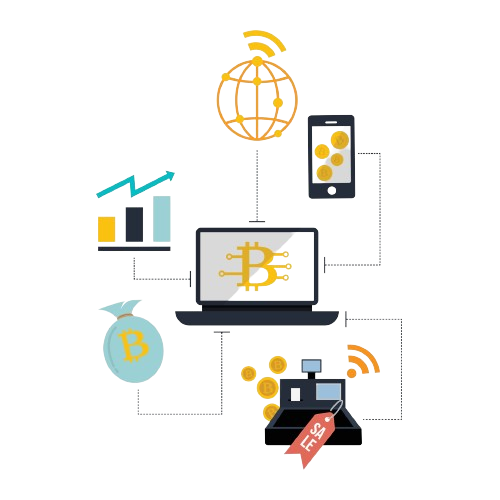
Finance underpins the entire economy, from businesses securing capital to grow to individuals accessing loans and managing wealth. However, traditional financial systems concentrate power on large intermediaries like banks, exposing users to fees, delays, discrimination, and data exploitation. The emerging domain of decentralized finance built on blockchain aims to transform finance into a more open, equitable, and empowering system aligned with American ideals of opportunity for all.
As the pioneering cryptocurrency at the forefront of blockchain innovation, Bitcoin plays an essential role in this decentralization shift remaking finance. Beyond payments, Bitcoin also drives the development of self-governing decentralized applications spanning lending, investing, insurance, and more. Examining Bitcoin’s expanding functionality unveils a vision for the future of finance in America – one based on user control, open participation, and collective prosperity.
The Struggles of Centralized Finance
Despite notable progress in expanding financial access, many Americans still cannot securely build wealth or access affordable credit through traditional institutions. Discriminatory policies and procedures continue driving inequality across income levels, racial groups, and geographies. Rural and low-income communities in particular face limited local banking options, preventing secure savings and wealth creation over generations.
At the same time, recurring economic disasters expose systemic risks inherent in concentrating control over finance. Events like the 2008 housing crisis and the 2020 COVID downturn revealed how failures at large banks and credit agencies severely, if not catastrophically, impact broader communities. All the while, personal financial data exploitation by institutions remains rampant.
Promise of Decentralized Finance
Unlike traditional finance, decentralized applications built on transparent blockchain networks allow users to securely exchange value, earn yield, and access other services peer-to-peer without centralized intermediaries. Control rests with regular participants rather than institutions, fostering accessibility, resilience, and accountability aligned with open economic opportunity for all.
Decentralized applications center on decentralization, transparency, accessibility, and composability. These applications focus on financial basics like payments, lending, trading, insurance, and more. Yet open-source protocols enable endless configurations to customize solutions benefiting individual users and communities.
Bitcoin’s Expanding Functionalities

While pioneered as a direct peer-to-peer electronic cash, innovation continues expanding Bitcoin’s capabilities as the core bridge between traditional systems and emerging decentralized financial applications.
Developers are unlocking functionality from payments to earning yield, fundraising, lending, derivatives, and beyond. Examining some emerging use cases highlights Bitcoin’s essential and expanding role in decentralized finance.
Faster Retail Payments
Solutions like the Lightning Network enable fast, low-cost Bitcoin payments ideal for retail transactions while preserving security. Payments clear in seconds, not days like traditional bank transfers or credit cards. Lightning offers American businesses and users a true cash-like experience digitally.
Accessible Onramps
Platforms like Strike ease moving dollars to Bitcoin and back by integrating seamless access and conversion directly into mobile banking apps more familiar to typical users. Such intuitive access ramps bring decentralized capabilities directly to people’s existing financial applications rather than requiring the adoption of an entirely new ecosystem.
User-Governed Platforms
Innovations like proof-of-reserves enable users to independently verify Bitcoin reserves backing custodial platforms like exchanges. Combined with decentralized information sharing, market forces rather than regulations can incentivize businesses to act transparently and secure user assets ethically even as the ecosystem scales.
Tokenized Fundraising
Issuing tokens on Bitcoin sidechains like Liquid Network allows businesses and projects to permissionlessly raise growth capital from worldwide community investors. such direct access expands opportunity beyond traditional venture capital concentrated in coastal urban centers.
Decentralized Financial Services
From insurance to derivatives and margin trading, decentralized finance innovations continue emerging to offer provably secure and transparent financial services without centralized intermediaries extracting fees at users’ expense. Access expands for wealth creation tools once restricted to institutional investors.
The Future of Finance – Open and Inclusive

Bitcoin and blockchain technology fundamentally expand possibilities to re-architect financial systems around principles of user control, accessibility, and shared prosperity that benefit communities instead of institutions. The continued growth of decentralized applications offers Americans an alternative to centralized finance’s systemic inequality and instability.
Unbound from geographical and regulatory barriers, decentralized finance fosters financial inclusion regardless of income level, race, gender, or location. Permissionless innovation on open-source blockchain protocols creates room for customizable solutions meeting specialized needs up and down the economic ladder. For example, programmable smart contracts are already expanding access to affordable credit and insurance within uninsured communities.
Unlike closed legacy systems where failures destabilize entire economies, decentralized networks contain risk and strengthen through continued open participation. Developments like decentralized stablecoins show how community collaboration can maintain purchasing power without centralized asset reserves or monetary controls setting the stage for greater financial autonomy.
Transitioning to this more democratic financial paradigm does come with personal responsibilities around security. With users directly controlling assets, the best Bitcoin wallet options providing safe key storage grow in importance alongside decentralized platforms enabling self-custody of funds. Education around responsible participation and prudent evaluation of service providers protects individuals exploring decentralization benefits.
Ultimately, Bitcoin and its underlying blockchain technology provide tools for users themselves to directly shape the ongoing evolution of finance. Driven by broad participation, decentralized finance promotes opportunity, resilience, and accountability so financial systems can work better for communities instead of institutions. The future of finance lies in the hands of innovators and participants joining together to guide the emergence of an open, empowering alternative aligned with ideals of opportunity and justice for all.
Conclusion
Finance forms a cornerstone for realizing American dreams of upward mobility and prosperity advancement. However robust, monolithic financial architectures centered on large intermediaries like banks and credit agencies systemically restrict opportunities for many through discrimination, instability, and data exploitation. Power concentrates on privileged institutions rather than users those structures were originally envisioned to serve.
Bitcoin’s breakthrough as digitally native cash unlocked groundbreaking decentralization functionality from direct payments to tokenized investing, lending, and financial services on transparent blockchain protocols. Such peer-to-peer exchange removes controlling intermediaries to make financial basics more directly accessible for regular users rather than just privileged institutions.
When responsibly developed, this expanding decentralized ecosystem holds the revolutionary potential to re-architect finance as an equitable arena supporting prosperity for entire communities of diverse participants. The innovations emerging around Bitcoin and blockchain technology ultimately provide tools for users themselves to directly advance financial systems aligned with American ideals of self-determination, collective prosperity, and social justice for all.